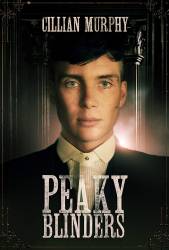Factual error: Michael's impending 18th birthday is often mentioned as the time he becomes an adult and can make his own decisions. The age of majority in 1922 (and until 1970) was 21.
Other mistake: When Polly tells Ada about her two children being taken from her, she says Michael was 5 and "Sally" was 3. When she goes to the seance she says her daughter would be 18, but shortly after that Tommy finds Michael and he is 17. Also, when Tommy tells Polly that he found the records on her children, the daughter's name changes to "Anna."
Other mistake: The Birmingham police officer, Moss, is still listed in the credits as Sergeant Moss. He held that rank in Season 1, but in Season 2 he wears inspector's rank insignia. Campbell does address him as Mr Moss, the correct title for an inspector.
Continuity mistake: The first man to die in the ploughed field "execution" scene had the back of his head blown away by a gunshot. In the replay in next episode, his head shows no such effect.
Factual error: Major Campbell heads the Irish branch of the secret service, but reports to Winston Churchill, the Colonial Secretary. The Colonial Office had nothing to do with Ireland, which at that time was part of the United Kingdom.
Episode #2.1 - S2-E1
Factual error: Season 2 covers 1921 to 1922. The car (YP8086) used in this episode was first registered 9th August 1926. (00:38:20 - 00:39:30)
Episode #2.1 - S2-E1
Factual error: Tommy refers to London at the south end of the Grand Union canal. However, the Grand Union in 1921/22 was what is now the Leicester branch. The Grand Union as it is known now was an amalgamation of 7 canals in 1929.
Episode #2.2 - S2-E2
Continuity mistake: When Polly holds the gun against Tommy the hammer is pulled. Next shot it isn't. (00:45:52)
Episode #2.2 - S2-E2
Factual error: Tommy's service record quoted by Churchill says that he served throughout the war with the Warwickshire Yeomanry. But we already know that he was a tunneller on the Western Front. The Warwickshire Yeomanry was a cavalry regiment (which actually served in Egypt, Gallipoli and Palestine and finally as a machine-gun battalion on the Western Front at the very end of the war). All tunnellers served with the Royal Engineers.
Episode #2.2 - S2-E2
Factual error: Tommy tells Churchill that he served at Verdun and several of Churchill's assistants say that they did too. There were no British troops at Verdun. It was a battle between the French and the Germans.
Episode #2.3 - S2-E3
Other mistake: When the mother of a boy Arthur beats to death while boxing comes for revenge, she fires a single shot from a six-shot revolver at Arthur's head. Arthur then takes the revolver from her, ejecting 6 unspent bullets instead of 5. (00:28:24)
Episode #2.3 - S2-E3
Continuity mistake: The bullets on the table change positions during the scene after they stopped moving. For example, when Arthur moves the glass, you see 5 between him and the glass. In the next shot, you can't see any of the bullets, even though you see the same area. They're back when she flips the table.
Episode #2.5 - S2-E5
Continuity mistake: The camera cuts between a wide shot and a close-up of Pol and Inspector Chester Campbell undressing her. Between scenes for the next minute, Pol's shirt is on in the close-ups but taken off in the wide shots. (00:24:40)
Episode #2.5 - S2-E5
Factual error: The Metropolitan Police officers who arrest Arthur in Camden Town are wearing the spiked helmets of the Birmingham City Police, not the boss-topped helmets of the Metropolitan Police, which we do see at other times.
Episode #2.6 - S2-E6
Factual error: The field marshal is wearing a revolver to the Derby. British soldiers are only ever armed on duty, certainly not when attending social events. He also wears his Sam Browne outside his shoulder strap instead of beneath it; no officer would do this.
Episode #2.6 - S2-E6
Factual error: Tommy's warrant is signed by the 'Minister of the Empire'. There was no such post. The Colonial Secretary dealt with the British Empire.






Answer: There has never been prohibition in England. There are many reasons for running an underground distillery. It would be a way to avoid things like government regulations, safe distilling methods, alcohol content limits, taxation, fix pricing, and so on.
raywest ★